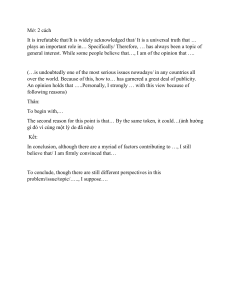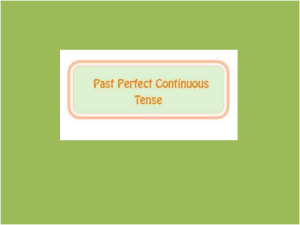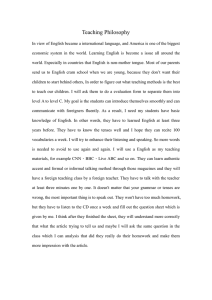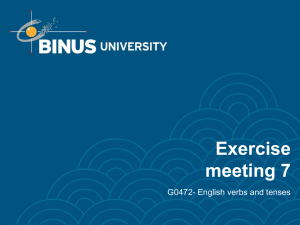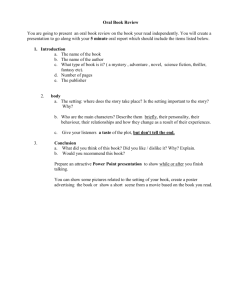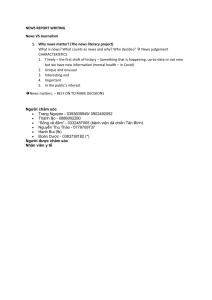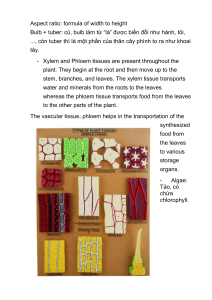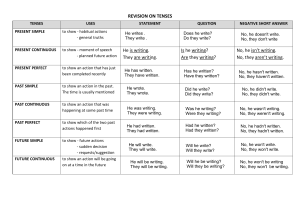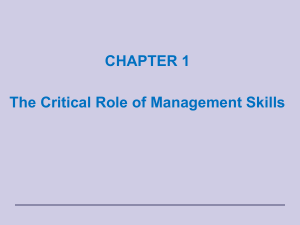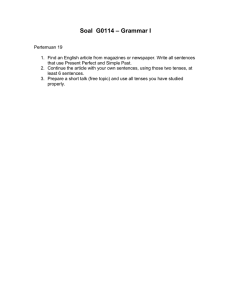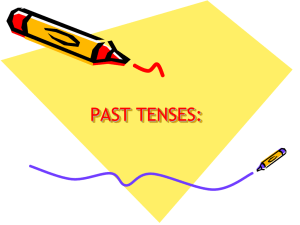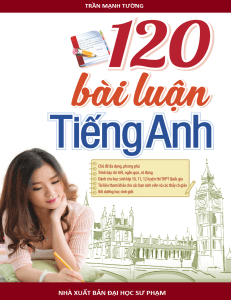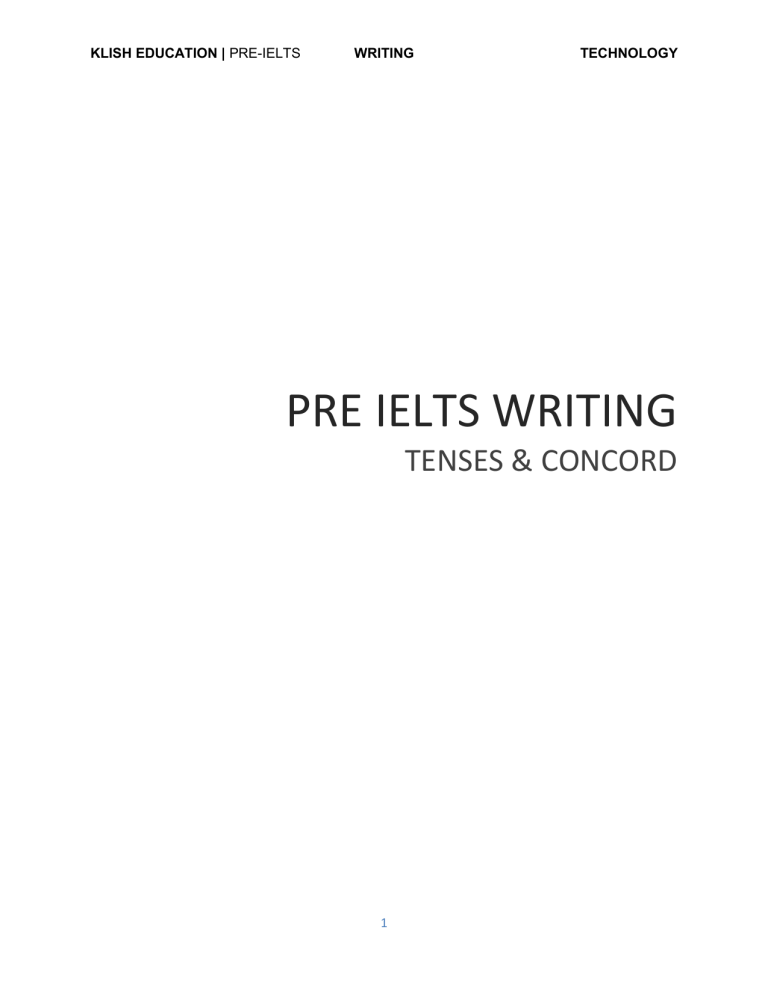
KLISH EDUCATION | PRE-IELTS WRITING TECHNOLOGY PRE IELTS WRITING TENSES & CONCORD 1 KLISH EDUCATION | PRE-IELTS WRITING [Blank page] 2 TECHNOLOGY KLISH EDUCATION | PRE-IELTS WRITING TECHNOLOGY COMMONLY USED TENSES IN IELTS PAST PRESENT 1. Past Simple - An action that ended in the past 1. Present Simple - A habit/habitual activities - A truth 2. Past Perfect - An action that happened after another in the past 2. Present Perfect - An action that happens after another at present 1. Yesterday 2. N + ago: 13 weeks ago 3. Last + N: last year/month… Present Simple 1. Often, usually, frequently, always, constantly, sometimes, occasionally, seldom, rarely, 2. Every + N: day/week…... FUTURE 1. Prediction - An activity / trend that might happen in the future Usage Time Indicators 1. Tomorrow 2. Next + N: next month/year/day…. 3. In + time: in 2 days/weeks…. Present Perfect Already, just, ever, never, recently, up to/till now, until now, lately, so far, yet, since, for… ____________________________________________________________________________ ____________________________________________________________________________ ____________________________________________________________________________ ____________________________________________________________________________ ____________________________________________________________________________ ____________________________________________________________________________ ____________________________________________________________________________ ____________________________________________________________________________ ____________________________________________________________________________ ____________________________________________________________________________ ____________________________________________________________________________ ____________________________________________________________________________ ____________________________________________________________________________ ____________________________________________________________________________ 3 KLISH EDUCATION | PRE-IELTS WRITING TECHNOLOGY ____________________________________________________________________________ ____________________________________________________________________________ Exercise 1: Divide the adverbs below into different groups that indicate specific tenses In the next 5 years In 2000 Recently Nowadays In recent years Today 10 years ago Lately Tomorrow Tense Simple Perfect 10 years ago, in 2000 Past Today, Nowadays Present Future In recent years, recently, lately Tomorrow, In the next 5 years Exercise 2: Make 3 sentences using 3 of the adverbs above 1.___________________________________________________________________________ ____________________________________________________________________________ 2.___________________________________________________________________________ ____________________________________________________________________________ 3.___________________________________________________________________________ ____________________________________________________________________________ Exercise 3: Complete the following sentence 1. In all the world, there (be) __________ only 14 mountains that (reach) __________above 8,000 meters. 2. He sometimes (come) __________ to see his parents. 3. When I (come) __________, she (leave) __________for Dalat ten minutes ago. 4 KLISH EDUCATION | PRE-IELTS WRITING TECHNOLOGY 4. My grandfather never (fly) __________ in an airplane, and he has no intention of ever doing so. 5. We just (decide) __________ that we (undertake) ____________ the job. 6. He told me that he (take) __________ a trip to California the following week. 7. I knew that this road (be) __________ too narrow. 8. Right now I (attend) __________ class. Yesterday at this time I (attend) __________class. 9. Tomorrow I’m going to leave for home. When I (arrive) __________at the airport, Mary (wait) __________ for me. 10. Margaret was born in 1950. By last year, she (live) __________on this earth for 55 years. 11. The traffic was very heavy. By the time I (get) __________to Mary’s party, everyone already (arrive) __________ 12. I will graduate in June. I (see) __________ you in July. By the time I (see) __________ you, I (graduate) __________. 13. I (visit) __________ my uncle’s home regularly when I (be) __________ a child. 14. That book (be) __________ on the table for weeks. You (not read) __________ it yet? 15. David (wash) __________ his hands. He just (repair) __________ the TV set. 16. You (be) __________here before? Yes, I (spend) __________ my holidays here last year. 17. We never (meet) __________ him. We don’t know what he (look) __________ like. 18. The car (be) __________ ready for him by the time he (come) __________tomorrow. 19. On arriving at home I (find) __________that she just (leave) __________a few minutes before. 20. When we (arrive) __________ in London tonight, it probably (rain) __________. 21. It (rain) __________ hard. We can’t do anything until it (stop) __________ 22. Last night we (watch) __________TV when the power (fail) __________. 23. That evening we (stay) __________up to talk about the town where he (live) __________for some years. 24. I (sit) __________down for a rest while the shoes (repair) __________. 25. Half way to the office Paul (turn) __________round and (go) __________back home because he (forget) __________to turn the gas off. 26. London (change) __________a lot since we first (come) __________ to live here. 27. While we (talk) __________on the phone the children (start) __________fighting and (break) __________a window 28. He used to talk to us for hours about all the interesting things he (do) __________ in his life. 29. You know she (stand) __________looking at that picture for the last twenty minutes. 30. I (spend) __________ a lot of time travelling since I (get) __________this new job. 31. When we (be) __________ at school we all (study) __________Latin. 32. When I (meet) __________ him, he (work) __________as a waiter for a year. 33. After he (finish) __________ breakfast he (sit) __________down to write some letters. 34. She (have) __________a hard life, but she’s always smiling. 35. I think Jim (be) __________ out of town. 36. He often (go) ___________to school on foot. 37. It was noisy next door. Our neighbors _________(have) a party. 5 KLISH EDUCATION | PRE-IELTS WRITING 38. It _________(get) dark. Shall I turn on the light? 39. I _________(look) for Christine. Do you know where she is? 40. At 5 o’clock yesterday evening, I_________(iron) my clothes. 6 TECHNOLOGY KLISH EDUCATION | PREIELTS WRITING TECHNOLOGY SUBJECT – VERB AGREEMENT SSingular + VS/ES General rules SPlural + V Independent clauses do not affect the main verb VS/ES Cases V Examples Cases 1. Uncountable nouns (even with quantity): a bit (of), much, (a) little, a large amount of, a great deal of 1. Plural countable nouns even with quantity: both, several, many, (a) few 2. The number of + N(s) 2. A number of 3. Currency, weight, time, length, temperature, etc. 3. The + Adj 4. Noun clauses - If / whether 4. Collective nouns - Wh-clause - That 5. Gerunds / Infinitives 7 P KLISH EDUCATION | PRE-IELTS WRITING TECHNOLOGY Exercise 1: Choose the most suitable answer 1. The trousers you bought for me (doesn’t/don’t) fit me 2. Physics (was/were) my best subject at school 3. Fortunately the news (wasn’t/weren’t) as bad as we had thought 4. The police (wants/want) to interview Fred about a robbery 5. Three days (isn’t/aren’t) long enough for a good holiday 6. Where (does/do) you family live? 7. England (have/has) lost all their football matches this season 8. (Does/do) the police know about the stolen money? 9. Can I borrow your scissors? Mine (isn’t/aren’t) sharp enough 10. I’m going to take a taxi. Six miles (is/are) too far for me to walk 11. John, along with twenty friends, (is/are) planning a party 12. The picture of the soldiers (bring/brings) back a lot of memories 13. The quality of these recordings (is/are) not very good 14. If the duties of these officers (isn’t/aren’t) reduced, there will not be enough time to finish the project 15. The effects of cigarette smoking (have/has) been proven to be extremely harmful 16. The use of credit cards in place of cash (have/has) increased rapidly in recent years 17. Advertisements on television (is/are) becoming more competitive than ever before 18. Living expenses in this country, as well as in many others, (is/are) at an all-time high 19. Mr. Jones, accompanied by several members of the committee, (have/has) proposed some changes of the rules 20. The levels of intoxication (vary/varies) from subject to subject 21. Neither Bill nor Mary (is/are) going to the play tonight 22. Anything (is/are) better than going to another movie tonight 23. My friend and colleague, James, (is/are) taking some time off work 24. Skating (is/are) becoming more popular every day 25. A number of reporters (was/were) at the conference yesterday 26. Your glasses (was/were) on the bureau last night 27. There (was/were) some people at the meeting last night 28. The committee (has/have) already reached a decision 29. A pair of jeans (was/were) in the washing machine this morning 30. Each student (has/have) answered the first three questions 8 KLISH EDUCATION | PRE-IELTS WRITING TECHNOLOGY Exercise 2: Complete the following essay with the correct form and tense of the word in bracket Nowadays the way many people interact with each other has changed because of technology. In what ways has technology affected the types of relationships that people make? Has this been a positive or negative development? SAMPLE ANSWER It is true that new technologies __________ (have) an influence on communication between people. Technology has __________ (affect) relationships in various ways, and in my opinion there __________ (be) both positive and negative effects. Technology has had an impact on relationships in business, education and social life. Firstly, telephones and the Internet __________ (allow) business people in different countries to interact without ever meeting each other. Secondly, services like Skype __________ (create) new possibilities for relationships between students and teachers. For example, a student can now __________ (take) video lessons with a teacher in a different city or country. Finally, many people use social networks, like Facebook, to make new friends and find people who share common __________ (interest), and they interact through their computers rather than face to face. On the one hand, these developments can be extremely __________ (positivity). Cooperation between people in different countries __________ (be) much more difficult when communication __________ (limit) to written letters or telegrams. Nowadays, interactions by email, phone or video __________ (be) almost as good as face-to-face meetings, and many of us benefit from these interactions, either in work or social contexts. On the other hand, the availability of new communication technologies can also have the result of isolating people and discouraging real interaction. For example, many young people __________ (choose) to make friends online rather than mixing with their peers in the real world, and these ‘virtual’ relationships are a poor substitute for real friendships. In conclusion, technology certainly __________ (revolution) communication between people, but not all of the outcomes of this revolution have been positive. 0 9 KLISH EDUCATION | PRE-IELTS WRITING TECHNOLOGY Exercise 3: Rewrite these Vietnamese sentences in English using what you have learned 1. Công nghệ ngày càng phát triển và có nhiều ảnh hưởng, cả tích cực lẫn tiêu cực, lên nhiều khía cạnh trong cuộc sống của con người ____________________________________________________________________________ ____________________________________________________________________________ ____________________________________________________________________________ 2. Một trong những ảnh hưởng tích cực là công nghệ như Internet hay điện thoại cho phép mọi người tương tác với nhau bất cứ lúc nào, không kể khoảng cách ____________________________________________________________________________ ____________________________________________________________________________ ____________________________________________________________________________ 3. Ví dụ, một du học sinh xa nhà có thể gọi cho bố mẹ qua ứng dụng như Skype hay Facetime mà không gặp khó khăn nào ____________________________________________________________________________ ____________________________________________________________________________ ____________________________________________________________________________ 4. Một ví dụ khác là mọi người có thể tìm thấy và kết bạn với những người có cùng sở thích với mình qua các mạng xã hội như Facebook ____________________________________________________________________________ ____________________________________________________________________________ ____________________________________________________________________________ 10 KLISH EDUCATION | PRE-IELTS WRITING TECHNOLOGY ANSWER KEYS - Tenses Exercise 3:3 1. are - reach 2. comes 3. came – had left 4. has never flown 5. have just decided – would undertake 6. would take 7. was 8. am attending - was attending 9. arrive - will be waiting 10. had lived 11. got - had already arrived 12. will see - see - will have graduated 13. visited -was 14. has been - haven’t you read 15. is washing - has just repaired 16. have you been – spent 17. have never met - looks 18. will have been- comes 19. found – had just left 20. arrive – will probably be raining 21. is raining - stops 22. were watching – failed 23. stayed – had lived 24. sat – were being repaired 25. turned – went – had forgotten 26. has changed – came 27. were talking – started - broke 28. had done 29. has been standing 30. have spent – got 31. were – studied 32. met – had been working 33. had finished - sat 34. has 35. Is 36. goes 37. were having 38. is getting 39. am looking 40. was ironing 11 KLISH EDUCATION | PRE-IELTS WRITING TECHNOLOGY - Subject – Verb Agreement Exercise 1: 1. don’t 2. was 3. wasn’t 4. want 5. isn’t 6. does 7. has 8. Do 9. aren’t 10. is 11. is 12. brings 13. is 14. aren’t 15. have 16. has 17. are 18. are 19. has 20. vary 21. is 22. is 23. is 24. is 25. were 26. were 27. were 28. has 29. was 30. has Exercise 2: 1. have had 2. affected 3. are 4. allow 5. create 6. take 7. interests 8. positive 9. was 10. was limited 11. are 12. choose 13. has revolutionized 12
